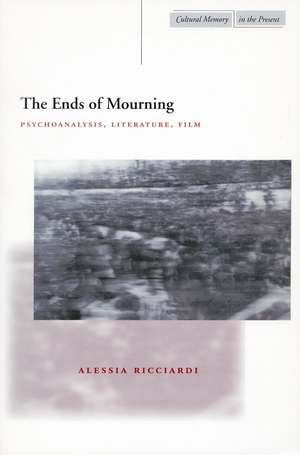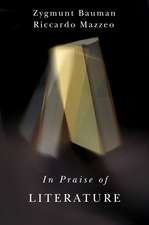The Ends of Mourning: Psychoanalysis, Literature, Film: Cultural Memory in the Present
Autor Alessia Ricciardien Limba Engleză Paperback – 18 aug 2003
The Ends of Mourning explores from an interdisciplinary perspective the contemporary crisis of mourning. In an age skeptical of history and memory, we relate to the past only as a spectacle, a product to be consumed in the cultural marketplace.
The book charts the emergence and development of the problem of mourning in the writings of Freud, Proust, and Freud's successor Lacan. Freud's idea of "sorrow work" and Proust's concept of involuntary memory defined the terms of the classic modernist account of mourning in the fields of psychoanalysis and literature. Yet their insistence on the egotistical aspects of loss to the exclusion of all ethical and political considerations threatens the dissolution of the question of mourning.
The book charts the emergence and development of the problem of mourning in the writings of Freud, Proust, and Freud's successor Lacan. Freud's idea of "sorrow work" and Proust's concept of involuntary memory defined the terms of the classic modernist account of mourning in the fields of psychoanalysis and literature. Yet their insistence on the egotistical aspects of loss to the exclusion of all ethical and political considerations threatens the dissolution of the question of mourning.
| Toate formatele și edițiile | Preț | Express |
|---|---|---|
| Paperback (1) | 170.28 lei 3-5 săpt. | |
| Stanford University Press – 18 aug 2003 | 170.28 lei 3-5 săpt. | |
| Hardback (1) | 702.59 lei 6-8 săpt. | |
| Stanford University Press – 18 aug 2003 | 702.59 lei 6-8 săpt. |
Din seria Cultural Memory in the Present
-
 Preț: 173.10 lei
Preț: 173.10 lei -
 Preț: 197.12 lei
Preț: 197.12 lei -
 Preț: 365.56 lei
Preț: 365.56 lei -
 Preț: 193.14 lei
Preț: 193.14 lei -
 Preț: 194.26 lei
Preț: 194.26 lei -
 Preț: 155.84 lei
Preț: 155.84 lei -
 Preț: 155.89 lei
Preț: 155.89 lei -
 Preț: 149.68 lei
Preț: 149.68 lei -
 Preț: 211.98 lei
Preț: 211.98 lei -
 Preț: 228.62 lei
Preț: 228.62 lei -
 Preț: 206.94 lei
Preț: 206.94 lei -
 Preț: 209.36 lei
Preț: 209.36 lei -
 Preț: 193.58 lei
Preț: 193.58 lei -
 Preț: 156.25 lei
Preț: 156.25 lei -
 Preț: 146.22 lei
Preț: 146.22 lei -
 Preț: 171.47 lei
Preț: 171.47 lei -
 Preț: 194.45 lei
Preț: 194.45 lei -
 Preț: 229.26 lei
Preț: 229.26 lei -
 Preț: 296.64 lei
Preț: 296.64 lei -
 Preț: 210.24 lei
Preț: 210.24 lei -
 Preț: 228.62 lei
Preț: 228.62 lei -
 Preț: 278.31 lei
Preț: 278.31 lei -
 Preț: 298.62 lei
Preț: 298.62 lei -
 Preț: 153.16 lei
Preț: 153.16 lei -
 Preț: 193.58 lei
Preț: 193.58 lei -
 Preț: 204.76 lei
Preț: 204.76 lei -
 Preț: 228.39 lei
Preț: 228.39 lei -
 Preț: 139.64 lei
Preț: 139.64 lei -
 Preț: 243.46 lei
Preț: 243.46 lei -
 Preț: 201.90 lei
Preț: 201.90 lei -
 Preț: 152.36 lei
Preț: 152.36 lei -
 Preț: 226.40 lei
Preț: 226.40 lei -
 Preț: 169.59 lei
Preț: 169.59 lei -
 Preț: 197.12 lei
Preț: 197.12 lei -
 Preț: 194.88 lei
Preț: 194.88 lei -
 Preț: 170.65 lei
Preț: 170.65 lei -
 Preț: 194.45 lei
Preț: 194.45 lei -
 Preț: 151.12 lei
Preț: 151.12 lei -
 Preț: 194.01 lei
Preț: 194.01 lei -
 Preț: 194.45 lei
Preț: 194.45 lei -
 Preț: 208.06 lei
Preț: 208.06 lei -
 Preț: 196.69 lei
Preț: 196.69 lei -
 Preț: 142.73 lei
Preț: 142.73 lei -
 Preț: 466.14 lei
Preț: 466.14 lei -
 Preț: 167.15 lei
Preț: 167.15 lei -
 Preț: 194.45 lei
Preț: 194.45 lei -
 Preț: 173.51 lei
Preț: 173.51 lei -
 Preț: 232.11 lei
Preț: 232.11 lei -
 Preț: 207.13 lei
Preț: 207.13 lei -
 Preț: 150.09 lei
Preț: 150.09 lei
Preț: 170.28 lei
Nou
Puncte Express: 255
Preț estimativ în valută:
32.59€ • 35.38$ • 27.37£
32.59€ • 35.38$ • 27.37£
Carte disponibilă
Livrare economică 01-15 aprilie
Preluare comenzi: 021 569.72.76
Specificații
ISBN-13: 9780804747776
ISBN-10: 0804747776
Pagini: 280
Dimensiuni: 152 x 229 x 15 mm
Greutate: 0.38 kg
Ediția:1
Editura: Stanford University Press
Colecția Stanford University Press
Seria Cultural Memory in the Present
ISBN-10: 0804747776
Pagini: 280
Dimensiuni: 152 x 229 x 15 mm
Greutate: 0.38 kg
Ediția:1
Editura: Stanford University Press
Colecția Stanford University Press
Seria Cultural Memory in the Present
Recenzii
"Alessia Ricciardi's The Ends of Mourning is a cogently argued and beautifully written work that deals with the fascinating and timely question of mourning. Ricciardi's book advances the existing body of work on trauma by considering the place of mourning in the transition from modernity to postmodernity. This place is, we learn, a missing place, for there is an important sense in which mourning is absent from the collective theoretical consciousness of our time; with a few exceptions, theory of the postmodern era has tended to promote a sense of the post-historical, as though we could somehow be simply free and clear of the past without ever having to mourn it. " —Peter Connor,Barnard College
"Alessia Ricciardi's truly outstanding book makes a significant contribution to critical theory in general and to psychoanalytically informed cultural criticism in particular. In many respects, it will prove to be a landmark study. . . . The End of Mourning is an extensive, brilliant, and brilliantly executed exposition of a complex and challenging theoretical and historical argument: that twentieth-century culture and thought has been impoverished—in spite of a fascination and indeed obsession with all things historical—by refusal to consider the implications of Freud's emphasis on mourning as a proper way of relating to the past." —Ulrich Baer,New York University
Notă biografică
Alessia Ricciardi is Assistant Professor in the Department of French and Italian at Northwestern University.
Textul de pe ultima copertă
“Alessia Ricciardi's The Ends of Mourning is a cogently argued and beautifully written work that deals with the fascinating and timely question of mourning. Ricciardi's book advances the existing body of work on trauma by considering the place of mourning in the transition from modernity to postmodernity. This place is, we learn, a missing place, for there is an important sense in which mourning is absent from the collective theoretical consciousness of our time; with a few exceptions, theory of the postmodern era has tended to promote a sense of the post-historical, as though we could somehow be simply free and clear of the past without ever having to mourn it. ” —Peter Connor,Barnard College
“Alessia Ricciardi’s truly outstanding book makes a significant contribution to critical theory in general and to psychoanalytically informed cultural criticism in particular. In many respects, it will prove to be a landmark study. . . . The End of Mourning is an extensive, brilliant, and brilliantly executed exposition of a complex and challenging theoretical and historical argument: that twentieth-century culture and thought has been impoverished—in spite of a fascination and indeed obsession with all things historical—by refusal to consider the implications of Freud’s emphasis on mourning as a proper way of relating to the past.” —Ulrich Baer,New York University
“Alessia Ricciardi’s truly outstanding book makes a significant contribution to critical theory in general and to psychoanalytically informed cultural criticism in particular. In many respects, it will prove to be a landmark study. . . . The End of Mourning is an extensive, brilliant, and brilliantly executed exposition of a complex and challenging theoretical and historical argument: that twentieth-century culture and thought has been impoverished—in spite of a fascination and indeed obsession with all things historical—by refusal to consider the implications of Freud’s emphasis on mourning as a proper way of relating to the past.” —Ulrich Baer,New York University
Descriere
This book charts the emergence and development of the problem of mourning in the writings of Freud, Proust, and Freud's successor Lacan. Freud's idea of "sorrow work" and Proust's concept of involuntary memory defined the terms of the classic modernist account of mourning in the fields of psychoanalysis and literature. Yet their insistence on the egotistical aspects of loss to the exclusion of all ethical and political considerations threatens the dissolution of the question of mourning.













